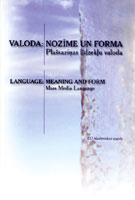Metaforas dzeltenajā presē: kognitīvais aspekts
Metaphor in the Yellow Press: the Cognitive Aspect
Author(s): Gita JuhņēvičaSubject(s): Language and Literature Studies, Media studies, Communication studies, Cognitive linguistics
Published by: Latvijas Universitātes Akadēmiskais apgāds
Keywords: metaphor; cognitive semantics; yellow press; initial field of expertise; the resultant field of expertise;
Summary/Abstract: On the basis of research of cognitive semantics, the article “Metaphor in the Yellow Press: the Cognitive Aspect” reviews some of the most frequently used types of metaphors in Latvian yellow press. In cognitive semantics, a metaphor (also called the conceptual metaphor) consists of two conceptual domains – source domain and target domain, and there are specific systematic correspondences between these domains which are based on experience, culture, and prior knowledge. Due to its specific character, the notion of human and relationship is metaphorized in the yellow press most of all; in addition, each conceptual metaphor highlights a separate aspect of the described notion, at the same time hiding others. In order to characterize a person, his/her actions, emotions, appearance, etc. in a figurative manner, comparison with animals (a pack of wolves, grey mouse), plants (flower of art), mythological and fairy-tale images (orange zombie, the king of jeans), food (the pie of journalists), a.o. is used the most often, while in characterization of love and relationship, the construction vocabulary (stable, contorted, broken relationship) and military vocabulary (enclose, conquer, victory) as well as plants (feelings blossom) and water reservoirs (shallow love) are used. A widespread type of metaphor is personification which allows to express positive and negative emotional evaluation (heartily squared suit, the sad piquet, fragile state power) as well as metonymy, which relates to metaphor where there are direct associations between both domains of experience instead of similarity, and which allows to shorten expressions or to highlight a particular aspect which should be paid especial attention to (TV faces, radio voices, Eagle (Ērglis) remixed).
Journal: Valoda: nozīme un forma
- Issue Year: 2009
- Issue No: 1
- Page Range: 25-33
- Page Count: 9
- Language: Latvian

